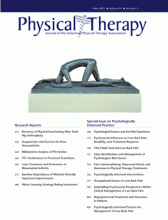Abstract
This article reviews the role of psychological factors in the development of persistent pain and disability, with a focus on how basic psychological processes have been incorporated into theoretical models that have implications for physical therapy. To this end, the key psychological factors associated with the experience of pain are summarized, and an overview of how they have been integrated into the major models of pain and disability in the scientific literature is presented. Pain has clear emotional and behavioral consequences that influence the development of persistent problems and the outcome of treatment. Yet, these psychological factors are not routinely assessed in physical therapy clinics, nor are they sufficiently utilized to enhance treatment. Based on a review of the scientific evidence, a set of 10 principles that have likely implications for clinical practice is offered. Because psychological processes have an influence on both the experience of pain and the treatment outcome, the integration of psychological principles into physical therapy treatment would seem to have potential to enhance outcomes.
Footnotes
Both authors provided concept/idea/project design and writing. Dr Linton provided project management. Dr Shaw provided consultation (including review of manuscript before submission).
- Received October 3, 2010.
- Accepted January 28, 2011.












